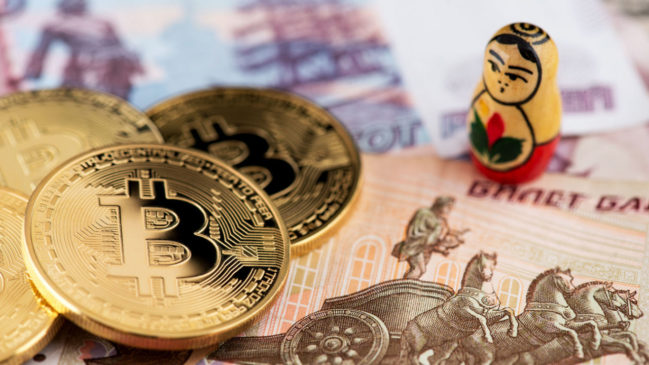Major crypto exchanges have failed to prevent sanctioned Russian banks and traders from transacting, according to a blockchain forensics report. At least two established coin trading platforms continue to allow Russians to use their bank cards in peer-to-peer deals, the analysis shows. It also highlights an increased Russian interest in tether.
Russian Traders Still Using Leading Cryptocurrency Exchanges to Bypass Restrictions
Some of the world’s largest digital asset exchanges have been failing with measures to prevent Russian banking institutions under sanctions from operating through their platforms, reveals a report by the blockchain analytics firm Inca Digital, announced on the first anniversary of Moscow’s invasion of neighboring Ukraine.
According to the research, quoted by Bloomberg and Politico, traders can still use debit cards issued by Russian banks sanctioned by the U.S., Canada, U.K., and the European Union among others, including the state-owned Sberbank, to trade on the peer-to-peer (PTP) platforms of two Seychelles-based exchanges, Huobi and Kucoin.
Inca CEO Adam Zarazinski explained that while neither of the two accepts funds from the blacklisted banks, allowing crypto buyers to trade with each other using accounts with sanctioned institutions represents a “direct violation of U.S. and European sanctions with a little bit of a loophole.” The exchanges are yet to comment on the findings.
Binance Offers Russians Ways to Convert Rubles Into Crypto, Inca Claims
The investigation examined data on 163 crypto trading platforms, centralized and decentralized exchanges, as well as P2P and OTC (over the counter) service providers. Nearly half of them allow Russian nationals to buy digital currencies, applying different know-your-customer (KYC) requirements, trading limits, and geolocation tools. For example, Singapore-based Bybit lets users convert rubles into crypto on its P2P platform and make fiat deposits, including through “any Russian-issued card.”
Binance, the industry leader in terms of daily trading volume, has been mentioned, too, with the report identifying potential vulnerabilities. The authors note that the exchange offers “multiple methods for Russians to convert local currency into crypto,” including via its OTC and P2P marketplace, available to them without KYC checks for up to $10,000.
Chagri Poyraz, global head of sanctions at Binance, stated that the exchange is a “full-KYC platform and was the first major exchange to implement EU crypto-related sanctions … Our P2P team takes the extraordinary added step of filtering any forms of communication between users to ensure there is absolutely no potential nexus with Russian entities through any sort of workaround,” he emphasized.
The study also points to the use of tether to circumvent Western sanctions on Russia, noting a spike in discussions on Russian social media about employing the stablecoin for remittances. “Tether is frequently used by Russians to move money out of the country,” the chief executive of Inca Digital said. Both Binance and tether have faced regulatory scrutiny over the past months.
What are your thoughts on the findings in the report by Inca Digital? Share them in the comments section below.
Image Credits: Shutterstock, Pixabay, Wiki Commons
Disclaimer: This article is for informational purposes only. It is not a direct offer or solicitation of an offer to buy or sell, or a recommendation or endorsement of any products, services, or companies. Bitcoin.com does not provide investment, tax, legal, or accounting advice. Neither the company nor the author is responsible, directly or indirectly, for any damage or loss caused or alleged to be caused by or in connection with the use of or reliance on any content, goods or services mentioned in this article.



